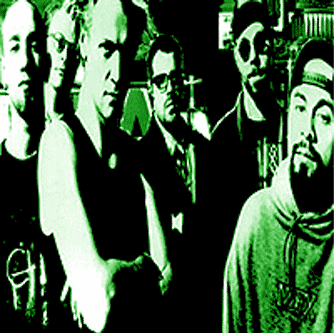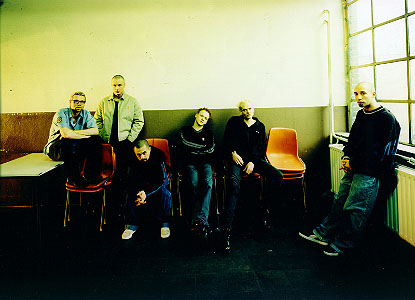
|
|
|
THE WAY IT ALL STARTED. When mechanical failure inside
computer takes place, the hard-drive fails, memory disappears and the system
crashes, the term you would use is Head Crash. When integrity and true innocence is replaced by man-made
gods, second hand dreams and transparent promises of the way life should be, your Head Crashes. Thus,
the appropriate title for one of Germany's most politically vocal and
socially critical artists. HeadCrash, best described as a
post-hardcore industrial band, a driving force of mesmerizing electronica,
jarring guitar riffage, and dynamic, aggressive, throbbing hip-hop vocals,
began as a studio project in K-Town, outside Frankfurt, Germany, in the early
'90s. It was a platform to create social awareness with the hopes of healing
the self-inflicted wounds among the divided "alternative" scene. Heavily
influenced by electronic music (Kraftwerk, Front 242, Consolidated)
and early hard core punk (Minor Threat, Bad Religion),
HeadCrash combined electronic programming with distorted, furious guitar
sounds. The message was clear; "corporate brainwashing is stealing our
souls... the system doesn't work". The band clearly tried to distance
themselves from "cookie-cutter corporate thinking", where the
population expects to see a McDonald's and a Mercedes on every corner. The
band arose from the ashes of various projects in the summer of 1993. as a
German garage band between Herwig Meyszner (guitar); Ulli Franke (keyboards);
Fritz Weber
(programming); and displaced
American, Allen Wright (vocals). HeadCrash (previously known as the
techno band Negro Sex) achieved notoriety early on when it was sued by
the Catholic Church for manipulating a photo of the Pope having his robes
adjusted. The new photo showed the religious icon deeply involved in a form
of lewd conduct. All charges were dropped though their records are still
banned in most parts of Europe. Hidden
Force Management and East-West/Warner Records quickly recognized this burst
of energy, and in 1994. provided the means for their first LP, "Direction
of Correctness". During the recording of the album, one of the
founding members, Fritz Weber, commited suicide. Despite the sad
cicrumstances, the album was finally released, with solid promotion via the "Black
Gold" single/video. The live concerts, which quickly earned HeadCrash
a legendary reputation as one of the best live bands to ever hit the stage,
began in 1994. with a support tour of L.A.'s Boo-Yaa Tribe. The record
featured Roger Ingenthron on guitar (ex-Spermbirds); and Nico Berthold
(drums). After the recording, another American expatriate, Shane Cooper
(vocals), joined the band. Allen
and Shane, the lyrical nucleus of HeadCrash, met at an American high
school in Germany. Allen, originally from Venice, California, began living in
Germany on and off since the age of thirteen. "I'd go back to California
once and a while and my friends were either dead, in juvenile hall, or just
plain fucked up. I didn't want to live like that, just another stain on the
sidewalk. Living in Germany is like a fairy tale sometimes. I don't have the
full weight of the American nightmare controlling my every thought crushing
me." The
next five years saw the band through 2 LPs with East-West/Warner Records (one
of which was re-released on Discovery-Elektra) and 1 LP with Sony Music -
totaling over 60,000 units in registered worldwide sales. 1995-1996
saw the production of the "Overdose on Tradition" LP. It
began as a concept album devoted to exposing the caustic state of corporate
Westernization. Produced by Jonathan Burnside (Consolidated, Clutch,
Melvins), HeadCrash spent three months in San Francisco's
Razor's Edge Studio recording. Live drums, slide guitar, wah-wah and acoustic
guitar ("King of Chrome") all lend to create a different sound
than their previous material. Tracks ranging from aggro-addictive "Safehouse"
to the funky-ass hip-hop ditty "King Of Chrome", and the
industrial influenced "Seamripper", shown the musical
diversity of HeadCrash without losing the main focus of revealing
political corruption, corporate greed and over demanding work/living
conditions. "Don't get us wrong, we aren't angry and angst ridden as
today's flavor of the month. Everyone's got to pay their rent but we're not
going to sell our soul to do it", stated Cooper. "It's time to
raise awareness about the globe's corporate activities. Everyone must be
accountable." The
album was accompanied by the "Safehouse" single, which
worked its way to the nation-wide airplay, both on MTV's "120
minutes" and "Headbanger's Ball", and on college/rock radio
stations across the U.S. Three of their five videos appeared on MTV
worldwide, with the latest garnering heavy daytime rotation. The song "Scapegoat"
appeared in 1994. on the Spanish horror film "El Dia De La Bestia"
(that ended up at the top 10 that year). Another European tour (most of the
shows sold out), a spot on the highly-coveted Rocknight stage with Smashing
Pumpkins, Sonic Youth, Cypress Hill, The Cure and Garbage,
and various festivals including the Strange Noise Festival w/ Prodigy
and Ani Defranco (HeadCrash unleashed in front of 35,000
people), and the Bizarre Festival w/ Korn, Social Distortion,
ect. 1996.
also saw HeadCrash's U.S. breakthrough, as Discovery-Elektra signed on
to push the "Overdose on Tradition" LP in the states. The
band's west coast tour (including an appearance at the Foundations Forum in
L.A.) helped push U.S. sales. All in all, "Overdose on
Tradition" went on to sell almost 30,000 registered copies in the
European and the U.S. markets. Year
1997. saw the "Fresh Ingredients" remix/live EP, another
European tour with Lodestar (ex-Senser). In early 1998. the
band parted ways with long-time band members, Nico Berthold and Ulrich
Frankie, and entered the studio to work on their new album, entitled "Lifeboat".
The band released their highly-acclaimed "Lifeboat" LP on
Sony Records in 1998. This set the stage for an appearance at Germany's
biggest summer festival, Rock Am Ring - featuring acts ranging from Incubus
to Van Halen. The single "Asphalt Ostrich" went onto
the "Lost In Space" soundtrack, the "Nachtgestalten"
soundtrack (one of the biggest German cult films of the year) and quickly
became a club staple across Europe. The video went straight into MTV/Viva
(German MTV) rotation, the bands subsequent appearance on the stages of the
biggest festivals in Europe set the precedence for what could've been a
massive global commercial break-through, but amidst personal meltdowns, it
exploded into shards.
April
of 1999. After almost two years, founding guitarist/programmer Herv Meyszner
began to pick up the pieces. Reunited with Shane Cooper (one of the original
vocalists, who had relocated to Colorado), they rebuilt the band and began to
track new songs. After recording the "2002", the reunion
demo with bassist Justin Stone and drummer Paul Stone of Senser
(U.K.), HeadCrash played its first live shows in over 2 and half
years. Both shows were packed, one sold out in 20 minutes. With the advent of
MP3 technology, the band - spanning 3 countries - is more productive than
ever before; there are 5 new songs beyond the "2002" demo
and more in the making. They are already booked into several European summer
festivals. With
the right management and record contract, HeadCrash will be poised to
continue where they left off - the brink of commercial break-through. |
+
|
A LITTLE SOMETHING FROM BACK IN A DAY. THE
DAILY BRUIN ONLINE 10/2/1996 By Vanessa VanderZanden Choose a non-commercial rock band. Choose Mom and Pop stores. Choose " At least there are still small concerts, like their UCLA show, which
is one of five Southern California stops on their "I think it's dumb," Wright says of the reaction. "It
was just a picture of the Pope with his robes blowing in the wind and his
servant kneeling in front, trying to help him. They posted it all over the
famous sex street in As Negro Sex, Wright and his crew created music comprised mostly of
samples and beats. Though they started more as a keyboard-based project than
a band, the group soon matured to a point where guitars, drums and bass took
over. Now, the eclectic bunch produces a sound combining techno beats, metal
riffs and hip hop vocals. Yet, Wright will be the first to point out, "I'm not trying to
pretend I'm Mr. Hip Hop Dude." "It's more together over here," he explains. "You can
just have an open conversation in the street," though he realizes,
"someone could punch my lights out, of course." Yet, keeping a degree of tolerance amongst people of all affiliations
define the purpose of Headcrash.
They maintain low prices to make their shows available to a diverse crowd
that ranges from hip-hop to hard-core kids. At shows, Cooper and Wright
explain in German the meanings behind their English lyrics. Then, they throw
the mike into the audience, ready for a sing-a-long. "Let's just hang out and drink some beer afterwards,"
Wright says of his band's post-show attitude. "We're not posing or
trying not to pose." Sick of seeing punk, ska, fascist and
hard-core individuals fighting over petty differences within the same
alternative scene, Wright and Cooper strive to create a feeling of unity
through their music. Also working on 'zines and
making videos, the band members barely squeeze out enough time to work at odd
jobs on the side. However, Wright feels sincere about Headcrash's
work. "There's always that chance that five people out of 500 who
watch the show will do something like start a 'zine
or whatever." However, Wright admits, "We're not martyrs." Content with their German existence, the two ex-patriots, Cooper and
Wright, are glad to be away from the pressures of corporate Cooper claims, "It's not such an exclusiveness of rich people
drinking beers." Yet, despite their zest for German life, the seven member band won't
mind making a short visit back to Yankee shores. After all, someone has got
to sell the album and, as Wright concedes, "We don't hate Concert: Headcrash plays |

